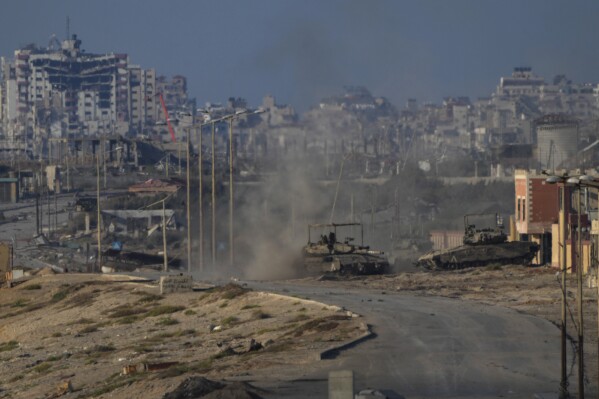The Latest | ‘Carry your son and run’: Gaza families describe fleeing Rafah under Israeli fire
Displaced Palestinian families in southern Gaza fled what they said was intensifying Israeli fire in north Rafah to seek shelter further north, describing a chaotic night as the sounds of fighting drew closer and prompted the difficult decision to evacuate.
“Just carry your son and run, we don’t have anything with us,” said one man, Mohammad al-Hadad. Some who fled overnight were able to return Friday, throwing their belongings atop vehicles or wagons pulled by donkeys and setting off.
“We do not know where we can go,” said a woman, Ghada Qudeh. “Since yesterday, we have not found food or drink.” She said her family fled after Israeli forces fired missiles at a house where they were sheltering Thursday.
The Israeli military said its forces were continuing to operate in Rafah but did not immediately comment on specific strikes. The military said one soldier had been killed during combat overnight in Rafah.
The people fleeing Rafah are some of the last holdouts in a city that was once filled with displaced Palestinians. However, Israel’s ground invasion since early May has driven nearly everyone who sought shelter there to leave. The U.N. estimates 1.3 million people have been displaced out of Rafah — more than half of Gaza’s entire population.
International criticism is growing over the nearly nine-month Israel-Hamas war as Palestinians face severe and widespread hunger. The war has largely cut off the flow of food, medicine and basic goods to Gaza, and people there are now totally dependent on aid. The top United Nations court has concluded there is a “plausible risk of genocide” in Gaza — a charge Israel strongly denies.
Israel launched the war in Gaza after Hamas’ Oct. 7 attack, in which militants stormed into southern Israel, killed some 1,200 people — mostly civilians — and abducted about 250.
Since then, Israeli ground offensives and bombardments have killed more than 37,600 people in Gaza, according to the territory’s Health Ministry, which does not distinguish between combatants and civilians in its count.
Currently:
— Israel lets 19 kids who are sick or wounded leave Gaza, in the first medical evacuation in nearly 2 months.
— Survivors of Israel music festival massacre unite to build a healing community.
— Ultra-Orthodox Jews block highway to protest Israel’s new mandatory military service ruling.
— UN Security Council demands Iran-backed Yemen rebels halt their attacks on ships in Mideast waters.
— Feds investigating violence during pro-Palestinian protest outside Los Angeles synagogue.
— Pennsylvania Senate passes bill to bar universities and pension funds from divesting from Israel.
— Follow ’s coverage of the war in Gaza at https://apnews.com/hub/israel-hamas-war.
Here’s the latest:
More Palestinians evacuate Rafah under Israeli fire as troops advance, residents say
RAFAH, Gaza Strip — More displaced Palestinians have fled parts of Rafah in southern Gaza on Friday after intensifying Israeli military operations came close to where they were sheltering. It was the latest evacuation in an area that has weathered an Israeli invasion since early May, forcing nearly all Palestinians there to leave.
On Friday, Palestinians who had tried to remain in the city’s north packed their belongings into vehicles or wagons pulled by donkeys and set off in the direction of Khan Younis. They said that they evacuated overnight under Israeli gunfire, and were returning to grab their belongings before fleeing the city for good.
“We went out under bullets and gunfire at night. Our children were dispersed. We do not know where they are. Where should we go?” asked Imad Asfour, a displaced Palestinian from east of Khan Younis.
Ghada Qudeh, a Palestinian who took shelter in Rafah after fleeing the southern city of Khan Younis, said Israeli forces had fired missiles at a house where she and her family were sheltering Thursday.
“We do not know where we can go,” she said “Since yesterday, we have not found food or drink. We only want a solution.”
Mohammad al-Hadad, another displaced Palestinian, wondered where to go. Palestinians say Israel’s declared safe zone, Muwasi, is a crowded tent camp with very limited access to bathrooms and hospitals.
“Just carry your son and run, we don’t have anything with us,” he said. “From al-Mawasi to Khan Younis to Rafah, where do we go?”
The initial Israeli operation into Rafah sent 1.3 million Palestinians fleeing, according to United Nations estimates. Israel says it needs to operate there to defeat Hamas’s remaining fighters in the area.
Funeral held for 7 people killed by Israeli airstrikes overnight in southern Gaza, as families describe fleeing over the bodies of dead and wounded
KHAN YOUNIS, Gaza Strip — Hospital officials in Gaza said Friday they received the bodies of seven people a day earlier, who their relatives said were killed by Israeli airstrikes.
A funeral was held Friday after the bodies were taken to Nasser Hospital in Khan Younis overnight, officials from the hospital said.
Family members at the funeral said Israeli strikes the seven people in an area between the southern cities of Rafah and Khan Younis. Witnesses to the strikes, also at the funeral, said they were in such a rush to flee that they had to walk over the bodies of dead and wounded.
The Israeli military said that forces operated in the Rafah area overnight, leading to the death of one soldier, but did not specify what the military activity entailed or confirm striking the area.
Israeli ground offensives and bombardments have killed more than 37,600 people in Gaza, according to the territory’s Health Ministry, which does not distinguish between combatants and civilians in its count.
Israel launched the war in Gaza after Hamas’ Oct. 7 attack, in which militants stormed into southern Israel, killed some 1,200 people — mostly civilians — and abducted about 250.
5 missiles land near ship in the Red Sea in likely the latest attack by Yemen’s Houthi rebels
WASHINGTON — A ship traveling through the Red Sea came under repeated missile fire Friday in a likely attack launched by Yemen’s Houthi rebels, authorities said, the latest targeting the crucial maritime route.
Five missiles landed near the vessel as it traveled off the coast of the rebel-held port city of Hodeida in Yemen, the British military’s United Kingdom Maritime Trade Operations center said.
The missiles landed near the vessel, but caused no damage, the UKTMO added.
The Houthis did not immediately claim the attack. However, it can take them hours or even days before they acknowledge an assault.
The rebels have targeted more than 60 vessels by firing missiles and drones in their campaign that has killed a total of four sailors. They seized one vessel and sank two since November. A U.S.-led airstrike campaign has targeted the Houthis since January, with a series of strikes on May 30 killing at least 16 people and wounding 42 others, the rebels say.
The Houthis maintain that their attacks target ships linked to Israel, the United States or Britain. However, many of the ships attacked have little or no connection to the Israel-Hamas war — including some bound for Iran.
US shifts assault ship to the Mediterranean to deter risk of Israel-Lebanon conflict escalating
WASHINGTON — The amphibious assault ship USS Wasp entered the eastern Mediterranean Sea this week as the U.S. positions warships to try to keep fighting between Israel and Hezbollah in Lebanon from escalating into a wider war in the Middle East.
While the Wasp has the capability to assist in the evacuation of civilians if full-scale war breaks out between Israel and Hezbollah along the Lebanon border, that’s not the primary reason it was rotated in, a U.S. official said. “It’s about deterrence,” the official said.
A second U.S. official said the rotation is similar to how the U.S. sent the USS Bataan assault ship into the waters around Israel shortly after Hamas’ Oct. 7 attack on the country, with the vessel remaining for months in the eastern Mediterranean to help provide options and try to contain the conflict. The officials spoke on the condition of anonymity to discuss sensitive operational details.
It comes as the Iranian-backed Hezbollah militant group and Israel have exchanged near-daily cross-border strikes since the Oct. 7 attacks that launched the Israel-Hamas war in Gaza, which have been escalating gradually.
The Israeli army said last week that it has “approved and validated” plans for an offensive in Lebanon, although any decision would come from the country’s political leaders.
Gen. CQ Brown, chairman of the U.S. Joint Chiefs of Staff, said Sunday that any Israeli military offensive into Lebanon would risk an Iranian response in defense of Hezbollah, triggering a broader war that could put American forces in the region in danger.
Disclaimer: The copyright of this article belongs to the original author. Reposting this article is solely for the purpose of information dissemination and does not constitute any investment advice. If there is any infringement, please contact us immediately. We will make corrections or deletions as necessary. Thank you.


